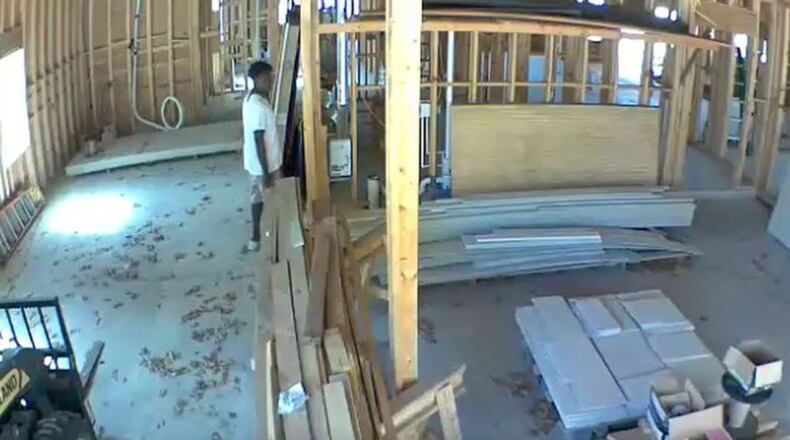BRUNSWICK – The man who called police after seeing Ahmaud Arbery inside a vacant home expressed concerns during testimony Wednesday that his decision may have set in motion the series of events that led to the 25-year-old being shot to death.
Matthew Albenze, who has lived in the Satilla Shores neighborhood for more than three decades, was splitting wood in his yard the afternoon of Feb. 23, 2020, when he spotted Arbery outside neighbor Larry English’s home under construction down the street.
Albenze said he went inside his home, got his cellphone and a handgun, which he put in his pocket, and walked under an oak tree across from English’s property. He then called a Glynn County police non-emergency number to report what he had seen.
The man later identified as Arbery was “just looking around” inside the home, Albenze said, adding he didn’t dial 911 that day because he didn’t consider the situation an emergency.
During his phone call, Albenze told the dispatcher the man had taken off running from the English home.
“I just need to know what he’s doing wrong,” the dispatcher told him.
On the witness stand, Albenze was asked if he thought Arbery saw him from across the street, and whether that made Arbery run away from the home under construction.
“I don’t know why he took off running. I don’t know if he saw me or not,” Albenze replied.
Arbery ran from the house and farther into the neighborhood. It was there he was chased by Greg McMichael, his son Travis McMichael, and their neighbor William “Roddie Bryan. The chase ended minutes later when Travis McMichael fired fatal shotgun blasts into Arbery from close range.
Credit: Body camera photos
Credit: Body camera photos
All three defendants face murder and other felony charges in the shooting. Wednesday marked the fourth day of testimony in the high-profile Glynn County trial.
On the witness stand, Albenze admitted he would rather be “anywhere else.” He also acknowledged that his role has led some people to launch personal attacks against him.
Defense attorney Bob Rubin, who represents Travis McMichael, got Albenze to agree that he has felt some guilt over what happened.
“Because you felt like you put into motion these events that turned tragic,” Rubin said.
“I thought maybe if he hadn’t (seen me), he wouldn’t have run away — I don’t know,” Albenze said.
“And that still weighs heavy on your heart,” Rubin noted.
“Yes,” Albenze said with a sigh.
In a police interview, Greg McMichael said Arbery was “hauling ass” running past his house. McMichael said this prompted him to get his own handgun and call for his son.
“He was running like people don’t run normally,” Greg McMichael told Glynn County Sgt. Roderic Nohilly. “He wasn’t out for no Sunday jog. He was getting the hell out of there.”
Albenze walked back to his home after calling the police. Moments later, he heard the three shotgun blasts that left Arbery dead in the street. He testified Wednesday that he got on his bicycle and rode toward the scene.
“I saw a police car. I saw Mr. Arbery laying on the street. I saw Greg and Travis there,” Albenze said. “It was kind of a shocking scene.”
Greg McMichael told police that afternoon that his son shot Arbery in self-defense.
“I think he was, his intention was, to grab that shotgun and probably shoot Travis,” Greg McMichael told Nohilly. “That’s in my mind. That’s what I saw. And with that in mind, if he’d have gotten that shotgun and there was any separation between Travis and him, I was going to cap his ass.”
The McMichaels and Bryan were questioned by Glynn County police following Arbery’s death, but no arrests were made until the GBI took over the investigation more than two months later.
Arbery was ‘trapped like a rat,’ Greg McMichael tells police
During his interview with police that afternoon, Greg McMichael told the detective that Arbery realized “he was not going to get away” as the men pursued him through the subdivision, Nohilly testified.
The elder McMichael said they had “chased him around the neighborhood for a bit, but he wasn’t winded at all,” according to the detective’s testimony.
“I mean this guy was — he was in good shape,” Nohilly quoted McMichael as saying during their interview. McMichael also described how the three men kept Arbery from leaving their neighborhood.
“He was trapped like a rat,” Greg McMichael told him. “I think he was wanting to flee and he realized that something, you know, he was not going to get away.”
Stephan Lowrey, the lead Glynn County investigator in Arbery’s killing, interviewed Bryan about his role in the chase. Bryan told him he followed Arbery in his pickup and tried to get him off the road, but he denied ever hitting him with the vehicle.
Lowrey no longer works for the police department, but he testified Wednesday that a dent was found on the driver’s side of Bryan’s pickup, along with white fibers and a handprint.
“I didn’t hit him,” Bryan told him during their interview. “Wish I would have, might have took him out and not get him shot.”
Outside the courtroom, Arbery’s mother, Wanda Cooper Jones, said it was Lowrey who called her the day of the shooting and told her that her son was dead. Lowrey told her that Arbery had been shot following a burglary and a confrontation with the homeowner, she said, but the two had never met in person.
“I finally got a chance to actually put a face to the name,” she said. “Investigator Lowrey was the individual who called me on that Sunday afternoon about 6:30 p.m. and told me that Ahmaud had committed a burglary. He told me that Ahmaud had committed a burglary, he was confronted by the homeowner and Ahmaud was killed.”
Cooper Jones said she listened to Lowrey for several hours Wednesday afternoon, and that he never mentioned any burglary.
“Ahmaud ran, Ahmaud was chased, Ahmaud was killed and then Ahmaud was lied on,” she said.
Al Sharpton holds prayer vigil outside courthouse
The Rev. Al Sharpton held a prayer vigil outside the courthouse Wednesday alongside Arbery’s parents and several civil rights attorneys. Sharpton criticized the fact that 11 of the 12 jurors selected in the racially charged case are white. He also called Arbery’s widely publicized death a “lynching in the 21st century.”
More than 50% of Brunswick’s population is Black, Sharpton noted. But empaneling a jury with just one Black man, he said, was “an insult to the intelligence of the American people.”
“Not only are those three on trial, but Georgia law is on trial,” Sharpton said as demonstrators cheered. “Have you grown from the days of Lester Maddox? Have you grown from the days of lynching?”
The Latest
Featured




